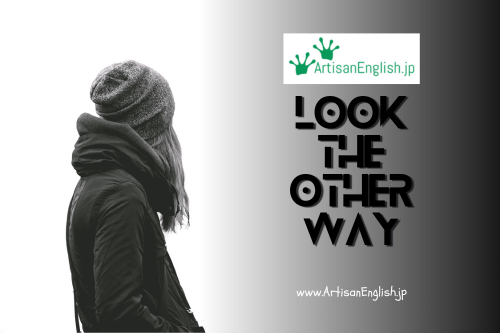
YouTube / iTunes / Spotify / Radio Public / Pocket Casts / Google Podcasts / Breaker / Overcast
Listen to ArtisanEnglish.jp posts & lesson intros here.
Phrase: Look the other way
Looking the other way means a situation where people deliberately ignore something they know is wrong or unethical.
It can refer to turning a blind eye to something happening or simply not acknowledging it.
Of course, this leads us to wonder when it is acceptable to look the other way and when not.
One example of when it was unacceptable to look the other way was the run-up to the Second World War.
In the 1930s, many countries in Europe, including Britain and France, chose to ignore the aggressive actions of Nazi Germany.
They hoped that by appeasing Hitler, they could avoid another war.
We all know how well that worked out.
Appeasement only emboldened Hitler and ultimately led to the invasion of Poland and the start of the war.
On the other hand, there are times when looking the other way can be acceptable.
For example, at the start of the Russo-Ukraine war in 2014, all countries chose not to get involved or to remain neutral.
While this may be seen as ignoring the conflict, it is understandable why some countries chose not to intervene.
For example, they may have been concerned about provoking a larger conflict, or they may have been unable to provide effective assistance.
Again, we all know how well that worked out.
Ukraine has been fighting Russian aggression for ten years now with no sign of an end in sight.
However, there are also times when looking the other way is unacceptable.
For example, when it comes to human rights abuses or acts of genocide, the international community must take action.
Right now, Israel is killing thousands of innocent Palestinians in a ‘war’ in Gaza.
In this case, looking the other way is complicity in the atrocities that are being committed.
Flesch-Kincaid Readability Test
This post is understandable by someone with at least an 8th-grade education (age 13 – 14).
On the Flesch-Kincaid reading-ease test, this post scores 62.
The easier a passage is to read, the higher the score on a scale of 0 – 100.

